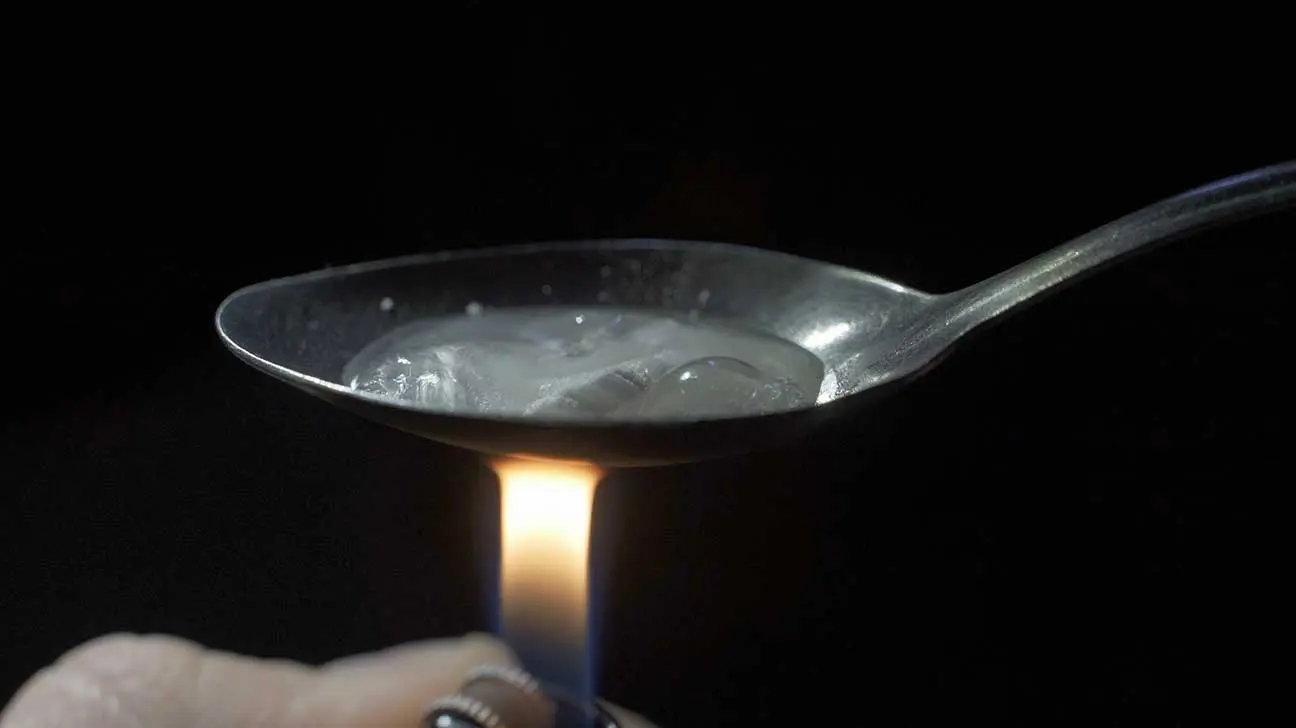
One of the most common ways people identify heroin use in a loved one is by the possession of drug paraphernalia.
Drug paraphernalia is a term to describe equipment, tools, or accessories that are used to ingest or produce drugs like heroin, cocaine, or methamphetamine.
How Heroin Spoons Are Used
Spoons are commonly used by people who inject heroin to cook the drug into an injectable liquid. Heroin injection is the most common route of heroin administration and may be a sign of heroin addiction.
Heating Heroin For Injection
Black tar heroin is a form of heroin that may be heated on a spoon to create an injectable liquid. According to research on heroin use, about half of people who use heroin report injecting it, as it can cause near-immediate euphoric effects.
Cooking Powder Heroin
Spoons can also be used to cook up heroin in its powder form, which can be white or brown in color.
According to the national Harm Reduction Coalition, people who cook heroin on a spoon are advised not to share their heroin spoons, syringes, or needles, as this can transmit infectious diseases.
What Are The Dangers Of Cooking Heroin?
Cooking heroin with a spoon and heat source can be dangerous for a number of reasons, with the primary danger being the use of the heroin itself.
Heroin Addiction
Heroin is a highly addictive drug that has played a leading role in the latest wave of the nation’s opioid crisis, along with illicit forms of fentanyl and fentanyl analogues.
Heroin can be addictive when used alone or with other drugs, such as cocaine, fentanyl, and prescription painkillers like OxyContin.
According to research, people who inject drugs like heroin have higher rates of drug dependence, addiction, and a greater need for substance abuse treatment.
Heroin Overdose
Injection drug use is a major risk factor for fatal opioid overdose.
Heroin overdose can occur if someone has taken too much heroin, or has used heroin that’s been laced with drugs like fentanyl, which is 50 times more potent than heroin on average.
Heroin overdose can cause respiratory depression (slow or stopped breathing), weak pulse, and coma. If someone has collapsed or is unresponsive after injecting heroin, call 911 right away.
Long-Term Effects Of Heroin
Over time, people who inject heroin may develop abscesses, damaged blood vessels, harm their veins, and risk withdrawal symptoms. This is a sign of heroin dependence.
Infectious Diseases
The Centers for Disease Control and Prevention (CDC) reports that injection drug users are at increased risk for HIV, hepatitis C, and hepatitis A.
These are infectious diseases that can be transmitted through the sharing of needles, syringes, spoons, or through unprotected sex.
Finding Addiction Treatment For Heroin
Finding burnt spoons, syringes, or needles can be a sign of heroin addiction, which may require treatment through an addiction rehab program.
Rehab programs for heroin addiction are offered across the country by thousands of rehab centers and healthcare providers.
Heroin addiction can be treated through detox, FDA-approved medications, and behavioral therapy as part of an inpatient or outpatient treatment program.
During the coronavirus pandemic, many rehab centers have continued to operate their rehab programs to meet the needs of people struggling with illicit substance use and addiction.
If you or someone you know is using heroin, don’t wait to reach out for help. Call our helpline today to learn more about heroin addiction and how to find addiction treatment near you.
Addiction Resource aims to provide only the most current, accurate information in regards to addiction and addiction treatment, which means we only reference the most credible sources available.
These include peer-reviewed journals, government entities and academic institutions, and leaders in addiction healthcare and advocacy. Learn more about how we safeguard our content by viewing our editorial policy.
- Centers for Disease Control and Prevention (CDC)—HIV and Injection Drug Use
https://www.cdc.gov/hiv/basics/hiv-transmission/injection-drug-use.html - Harm Reduction Coalition—Getting Ready: Preparing Yourself & Your Equipment
https://harmreduction.org/issues/safer-drug-use/injection-safety-manual/preparing-equipment/ - U.S. National Institute on Drug Abuse (NIDA)—Heroin DrugFacts
https://www.drugabuse.gov/publications/drugfacts/heroin - U.S. National Library of Medicine: NCBI—Comparing Injection and Non-Injection Routes of Administration for Heroin, Methamphetamine, and Cocaine Uses in the United States
https://www.ncbi.nlm.nih.gov/pmc/articles/PMC3225003/ - TIME—A Gallery Owner Was Arrested After Leaving a 10-Foot Heroin Spoon Sculpture Outside OxyContin Maker Purdue Pharma
https://time.com/5320384/fernando-luis-alvarez-purdue-pharma/


